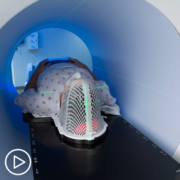Head and Neck Cancer Clinical Trials | What Are the Benefits?
Head and Neck Cancer Clinical Trials | What Are the Benefits? from Patient Empowerment Network on Vimeo.
What benefits can head and neck cancer clinical trials bring to patients? Expert Dr. Ezra Cohen discusses clinical trial participation rates, explains how trials move research forward, and details questions to ask your doctor when considering joining a clinical trial.
See More from Evolve Head & Neck Cancer
Related Resources:

|

Head and Neck Cancer Research | How Innovation Leads to Advances in Care |

|
Transcript:
Katherine:
A key part of research moving forward is the clinical trial process. Can you talk about the benefits of patient participation?
Dr. Cohen:
Of course. And I’m certainly a firm believer. It’s been part of what I’ve been doing for, again, over 20 years. And, so, certainly I think clinical trials are a critical component of our ability to produce better outcomes and move forward. The sobering reality is that only 3 percent of adult patients actually participate in clinical trials.
Katherine:
Wow.
Dr. Cohen:
And if we’re really going to move the field forward and be where we want to be with cancer, and that is to either cure as many people as we can or turn cancer into a chronic disease, better yet in many individuals, detect it early and prevent it. We need much greater participation in clinical trials. So, that being said, nothing is going to happen, we are not going to make strides forward in therapeutics and diagnostics, whatever in prevention, without clinical trials. Even the basic standards of care that we engage in now, and I mentioned that drug pembrolizumab (Keytruda), that was approved on the basis of a large randomized clinical trial.
Now, having said that, I think patients – part of the responsibility is on patients to ask their provider, “Well, what about clinical trials?” There is almost always a clinical trial that is available given a specific setting. The challenge is that it may not be available where the patient is seeking care. And there is a large disconnect in that regard. Now, there are different organizations that are trying to improve that, improve the diversity of participation in clinical trials and the equality of availability of clinical trials to the entire population, not just people going to large academic medical centers. But, that’s the first thing I would tell patients, is part of the list of questions that you have for your provider, especially at the beginning and throughout the entire process, is there a clinical trial that would be applicable to my situation?
And if the answer is, “Well, no.” The follow-up should be, “Well, what about in the area?” Or, “What about something that may not necessarily be available in this practice but what about somewhere else in town or somewhere I could access?” Of course, that may not be possible for all patients. But if it is, I would encourage all people to ask that question. And then there is a large responsibility, I think, on providers to make clinical trials available if we’re going to improve that number from 3 percent.
There are a lot of exciting agents being studied now in head and neck cancer – immunotherapy drugs, antibody drug conjugates, novel mechanisms, cell therapies, vaccines. So, there’s certainly no paucity of interest in developing drugs in head and neck cancer and technologies as well. So, there are clinical trials available, and I think we, as a community, need to make a – need to do better in enrolling patients on those studies.









